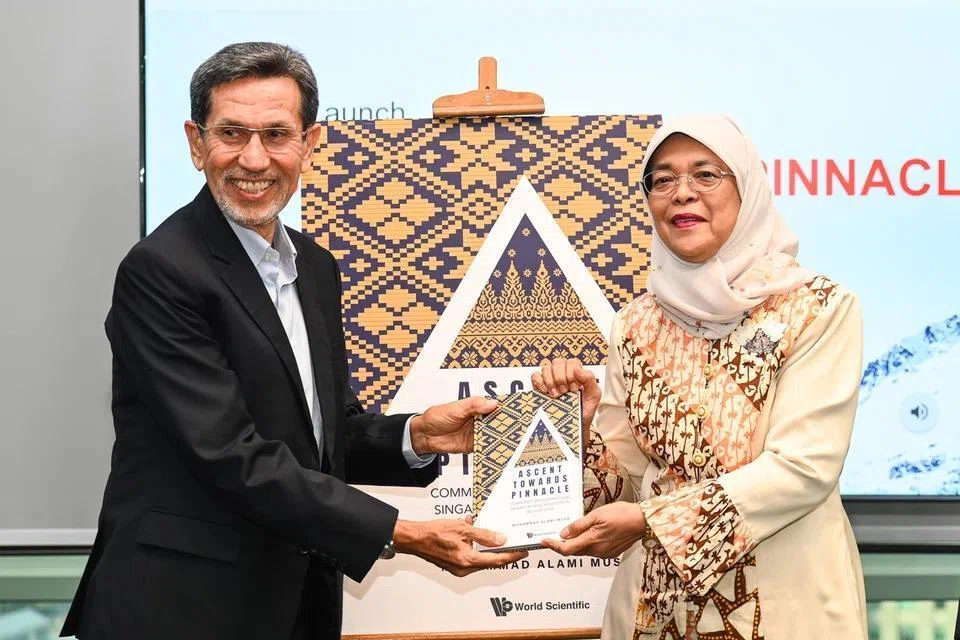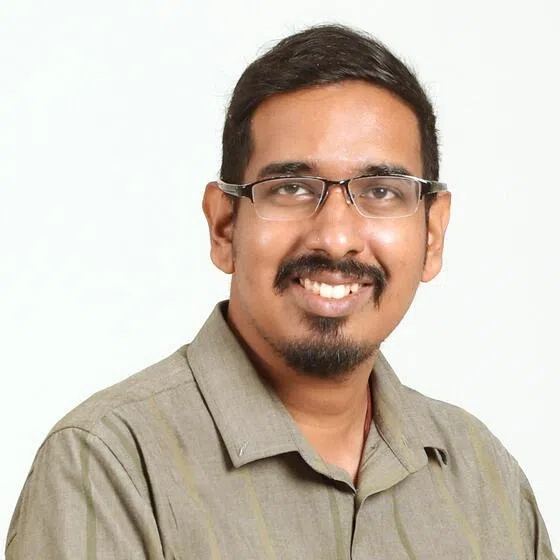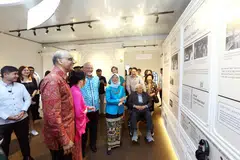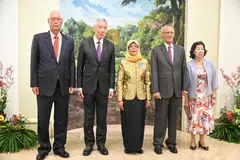Singapore’s Muslim community has found a niche for itself without losing its values or culture, former President Halimah Yacob highlighted on Oct 16.
“The Singapore Malay-Muslim community has become optimistic, confident, and more actively engaged in mainstream society. It is also a contributor to many dimensions of national life that include stronger interreligious relations, greater social peace, and contributing to humanitarian causes,” she said.
Speaking at the Ascent Towards Pinnacle book launch at the National Library, Mdm Halimah underscored the community’s progress as a model for Muslim minorities globally.
Written by Mr Mohammad Alami Musa, an adjunct senior fellow at the S. Rajaratnam School of International Studies and Singapore’s non-resident Ambassador to Algeria, the book draws on over 55 years of personal experience, activism, and an extensive private collection of primary sources.
Mdm Halimah, who is currently chancellor of the Singapore University of Social Sciences, highlighted that the book explains how a minority Muslim community lives successfully in a secular state with full participation in economic, political, and social activities “whilst not compromising on core values of Islam”.
“In other words, there is no incompatibility between being a good Muslim and a good citizen,” she said.
Mdm Halimah also noted the community’s active involvement in inter-religious engagement, describing it as a “significant marker of success”.
Recalling Singapore’s challenging post-independence history, Mdm Halimah described the early years after separation from Malaysia as “fraught with uncertainty, anxiety, pain, and even despair,” as the community struggled to adjust to new national norms of secularism, meritocracy, and multiculturalism.
Recounting that difficult period, she recalled the lingering negative stereotypes the community has faced. She shared an anecdote of a non-Malay colleague wrongly claiming that Malays have a “quota” for university admission. “I almost fell off my chair,” Mdm Halimah exclaimed, highlighting the misinformation and lack of understanding.
Noting that the community relied on self-help strategies, unity, hard work, and cooperation with fellow citizens and the state, Mdm Halimah said that these efforts gradually pulled the community out of its developmental challenges.
She noted that this perseverance has led to an increase in successful Malay-Muslims who are well educated, well-skilled, and entrepreneurial. She emphasised that the community is not just benefiting from, but also contributing to, Singapore’s national life, including strengthening inter-religious relations and contributing to humanitarian causes.
Mdm Halimah also highlighted a positive convergence of values among the young: “Gen Zs, especially, are very value-centric, regardless of their race or their religion.”
Mr Alami, 69, said his book took around a year and a half to complete and described the work as a product of passion and academic analysis.
He dissected the community’s 55-year journey into five distinct time periods, organising his writing into seven chapters. He chose 1966 as his starting point, marking the drafting of the Administration of Muslim Law Act (AMLA) by former attorney general Ahmad Ibrahim.
Describing the best years of the Muslim community as ahead, Mr Alami hopes to showcase the success of the Malay-Muslim community, which, despite its lack of resources during Singapore’s early days, pulled itself up to a state of success and achievement.
“This is part of the Singapore success story and something that we should all be proud of as Singaporeans, regardless of race and religion,” he said.




